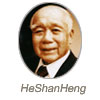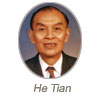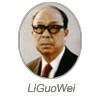AWARDEE OF MEDICAL SCIENCES AND MATERIA MEDICA PRIZE
WU ZUZE
Wu Zuze (Wu Chu-tse), was born in October 1935 in Zhenhai, Zhejiang Province, graduated from Shandong University in 1957. He has successively held the posts of research professor, director of Institute of Radiation Medicine, and president of Chinese Academy of Military Medical Sciences, chairman of Chinese Society of Experimental Hematology, and standing committee member of Chinese Medical Association. In 1993, Prof. Wu was elected the academician of Chinese Academy of Sciences.
In 1973, Prof.Wu went to Britain to further study cell kinetics. Having combined his own experience with wide-ranging reading of literature, he later published a monograph entitled An Introduction to Hemopoietic Cell Kinetics, which became the first monograph in China to introduce hemopoietic stem cells and kinetics of blood cell formation.
He adopted natural sex chromosomes and sex-determine gene as genetic marker, combining the single spleen colony transfer technique and confirmed that spleen colony forming cells not only possess the function of reconstituting myeloid cells but also that of lymphocytes, therefore has clarified the disputes about the nature of this type of cells, and further provided scientific basis for the heterogeneity of hemopoietic stem cell population.
He and his colleagues, while carrying out the experimental studies on properties and functions of animal and human fetal liver cells, systematically put forward the kinetic changes of hematopoiesis and hemopoietic stem cell in fetal liver during the embryonic development. They found a four-to-five-month-old fetal liver contains the most abundant hemopoietic stem cells, and on this theoretical basis in treating a case of acute radiation sickness with severe bone marrow failure by accomplishing cooperatively the first fetal liver transplantation in the world. Furthermore, they made thorough studies on purification and biological characteristics of the three types of factors in fetal liver including the hemopoietic proliferation stimulator, hepatic growth factor, and low molecular tumor suppressor.
Prof. Wu, having thoroughly studied the rule of radiation injury of hemopoietic stem cell and its recovery, comprehensively expounded the kinetics of the biphasic response of hemopoietic stem cells to chronic low dose rate irradiation and systematically revealed the mechanism of the phenomenon that the cumulative radiation dose required to cause the animal's death at low dose rate of X or γ rays under continuous irradiation is several times higher than that of acute irradiation ones. By studying the radiation injury of hemopoietic stem cells and hematopoietic microenvironment, these animal observation results have been confirmed in the course of several cases of accidental radiation sickness caused by the acute or chronic irradiation. At the International Conference on Biological Effects of Large Dose Ionizing and Non-ionizing Radiation in 1988, Prof. Wu presented an academic report entitled “Radiation damage and recovery of hemopoietic stem cells and microenvironment after long term continuous irradiation at low dose rate", which received high appraisals from the experts. In 1988, Prof. Wu was elected the first Chinese council member of the International Radiation Research Association.
After leaving from the post of the president of the Chinese Academy of Military Medical Sciences at the end of 1996, Prof. Wu became the director of PLA Key Lab. of Experimental Hematology mainly working on the experimental studies and development of gene therapy.
He examined the function of hepatocyte growth factor (HGF) in stimulation of angiogenesis and the feasibility of gene therapy using HGF via recombinant plasmid to treat peripheral artery occulusive disease and myocardial ischemia using HGF gene via recombinant adenoviral vector. As an approach to human gene therapy he and his colleagues adopted dog as ischemia model and showed that both are effective and relatively safe with regional administration. As HGF is a factor with multipotent functions including organ regeneration and anti-apoptosis activity, therefore it is beneficial in the process of wound recovery and reducing excessive scarring formation.
As a chief editor, he published the monographs of Transplantation of Hemopoietic Stem Cells in 1988 and Regulation of Hemopoiesis in 2000, which promoted the development of experimental hematology in China.
Prof. Wu's innovation, practical-mind, and devotion initiate a deep impression on his students and encourage them. Many of them have achieved in their professional career.






